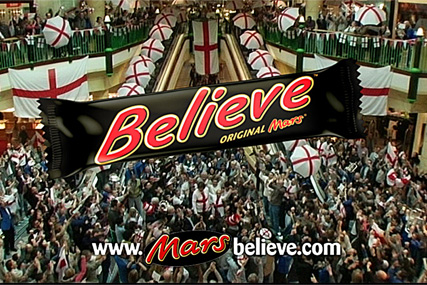The tightening of the rules regarding advertising linked to FIFA's World Cup tournaments does not appear to have put a stop to ambush marketing.
It is no surprise that brands outside the list of official sponsors want to gatecrash the quadrennial football extravaganza, which kicks off on 11 June in Johannesburg, South Africa. However, they must tread carefully to avoid being slapped down by FIFA or alienating consumers.
For example, while Tesco is an official partner of the English Football Association, it does not have any affiliation with the World Cup. Nonetheless, the retailer is able to capitalise on its link with the England team to drive sales during the event.
Last week it rolled out a 'Win with Clubcard' World Cup competition, which gives cardholders the chance to play for World Cup-and football-related prizes through promotion partners, including Coke and Carlsberg.
Indirect association
Tove Okunniwa, managing partner at sports and entertainment agency MEC Access, suggests Tesco is in a good position to exploit its footballing links.
'As an official FA and England team partner, Tesco has some credibility in football and has a right to associate itself with football and England during the World Cup by using these rights,' she says. 'It can also run promotions with its trade partners and suppliers that have official rights to the World Cup, such as Coca-Cola.'
Coke's arch-rival, Pepsi, is also making plans to cash in on the tournament without falling foul of FIFA's rules. Its 'spoiler' marketing is based on a strong association with football through its brand ambassadors including Chelsea and Ivory Coast striker Didier Drogba and Liverpool's Spanish forward Fernando Torres.
Moreover, the fact that Pepsi's activity has an African theme, at a time when the World Cup is taking place on this continent for the first time, seems unlikely to be a coincidence.
Mars, meanwhile, offers a prime example of a brand that was extremely successful with ambush marketing during the last World Cup. Its 'Believe' packaging was designed to illustrate its support for the England team.
The confectionery manufacturer also sees the value in having an indirect official link and has since signed up as an official FA partner. The company describes the deal as making 'good business sense'.
The difficulty lies with smaller FMCG brands, such as Frijj, Tic Tac and McCoy's, which have decided to run football-themed activity but lack a developed connection with the sport
A study by cash-machine advertising specialists atmAd suggests that 35% of British consumers will respond to World Cup-linked advertising only if it is from one of the 13 official FIFA World Cup sponsors or partners.
According to the research, this group of consumers will also react negatively to any other campaign they perceive to be 'jumping on the bandwagon', particularly if the brand's products have little to do with the tournament.
Justin Stark, director of national sales at atmAd says: 'The World Cup is a great opportunity for brands, but over the years consumers have become more discerning and FMCG brands risk scoring an own goal if their link to the tournament is tenuous and their campaign is not especially creative.'
Deft marketing
Steve Martin, chief executive at M&C Saatchi Sports & Entertainment, argues that, while every brand aspires to be 'official', because of the potential positive sales impact, the World Cup can trigger 'madness' among brands. 'You don't want to come across as second-rate, so you have to be clever and more on the edge creatively,' he says. 'Brands have grown up over the last four World Cups or so and, while FIFA wants to protect sponsors and media space, unofficial brands have become more wise to what they can get away with.'
Orit Peleg, shopper marketing planning director at OgilvyAction, believes that although consumers are faced with a blanket of football-related promotions, some value can still be gained. 'The most important thing for brands that are not official sponsors is to be very clear on the value they expect from their promotion in return for their investment and how they can be more than just a "me too" to truly get the most out of it,' she says.
'Another added commercial value could be reinforcement of the consumption occasion. If the promotion creates an association between match-watching and consumption, then the ROI benefits can extend beyond the tournament itself.'
This summer's World Cup will be a colossal event, not only on the pitch, but also in the supermarket aisles. Brands will fight tooth and nail to score extra sales, but they will risk devaluing their offer if the promotions look opportunistic or lazy.


